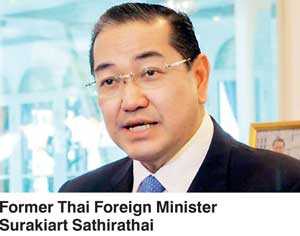Wednesday Feb 18, 2026
Wednesday Feb 18, 2026
Monday, 23 July 2018 00:00 - - {{hitsCtrl.values.hits}}
YANGON (Reuters): The chairman of an international panel set up by Myanmar to provide advice on the Rohingya crisis has rebutted criticism by the body’s former secretary, saying the panel is effective and the Government has acted on its recommendations.

Former Thai Foreign Minister Surakiart Sathirathai, who last year was picked by Myanmar to chair the group, said late on Saturday that progress has been made in the violence-torn Rakhine State in line with the advice the panel has given to the Government.
His comments follow the resignation of Kobsak Chutikul, a retired ambassador and former member of Thailand’s Parliament, as secretary of the panel. Kobsak told Reuters on Friday that the group had been “kept on a short leash” and achieved little in the six months since its formation in January.
Kobsak said the panel had been barred from accepting international funding or setting up a permanent office and told to conduct meetings online. Representatives of the Myanmar army have refused to meet the board.
“The statement that the Advisory Board lacks achievements is incorrect and unfair,” Surakiart said in a statement, citing recent moves by the Myanmar Government to re-engage with the United Nations after last year’s crackdown on Rohingya Muslims. Surakiart said the Government has, for example, signed an outline deal with two UN agencies on Rohingya returns, engaged with the UN Special Envoy to Myanmar, invited UN Security Council representatives to the country and sent a minister to visit the Rohingya refugee camps in Bangladesh. It is unclear to what degree the recommendations of the panel, whose official name is the Advisory Board for the Committee for Implementation of the Recommendations on Rakhine State, on these matters have influenced the Government’s decision-making.
The panel was set up by the Myanmar Government and was supposed to advise it on how to implement the recommendations of an earlier commission, headed by former UN Secretary-General Kofi Annan, on solving the crisis in western Rakhine, which has been riven by ethnic and religious tensions for years.